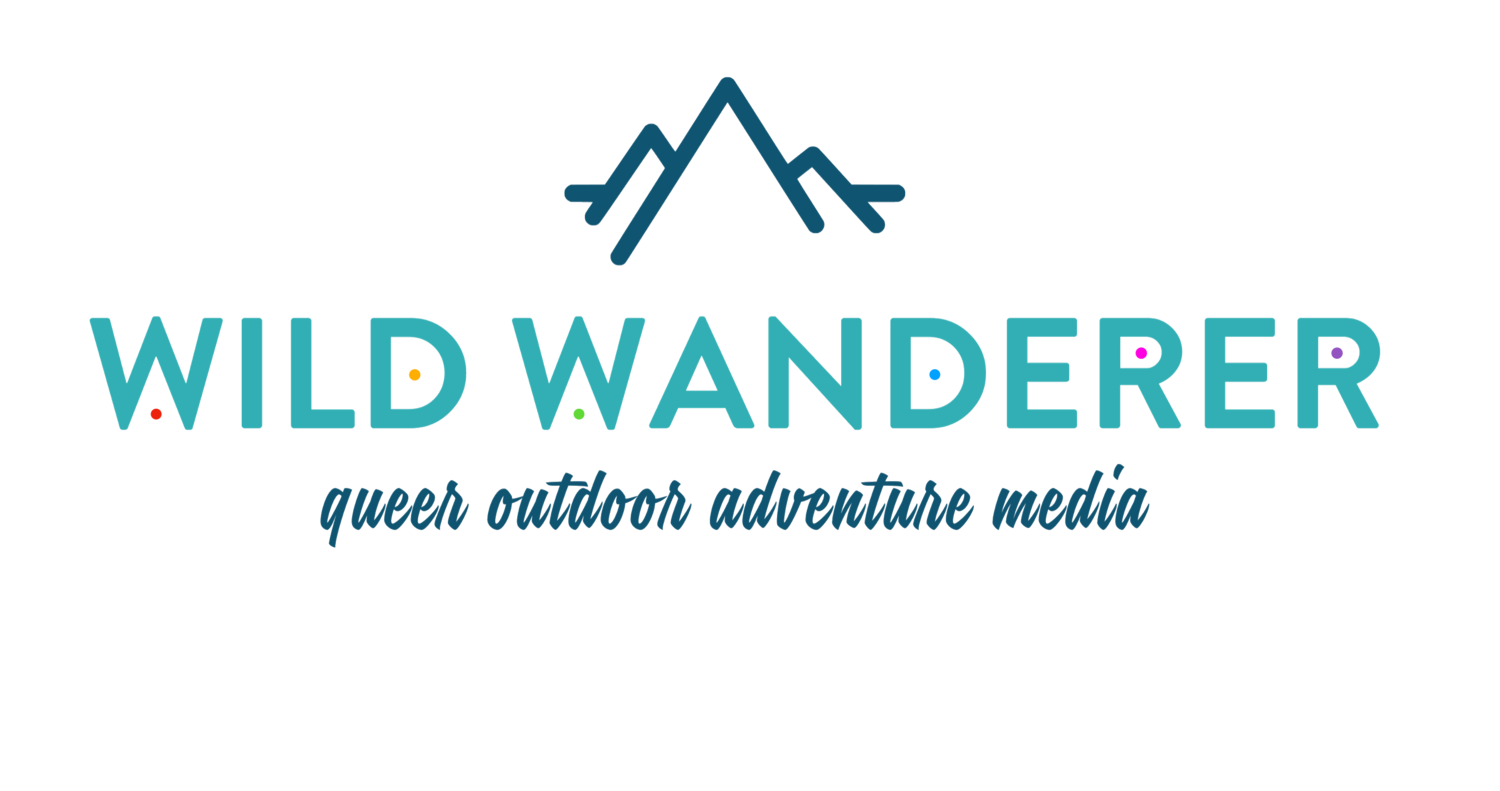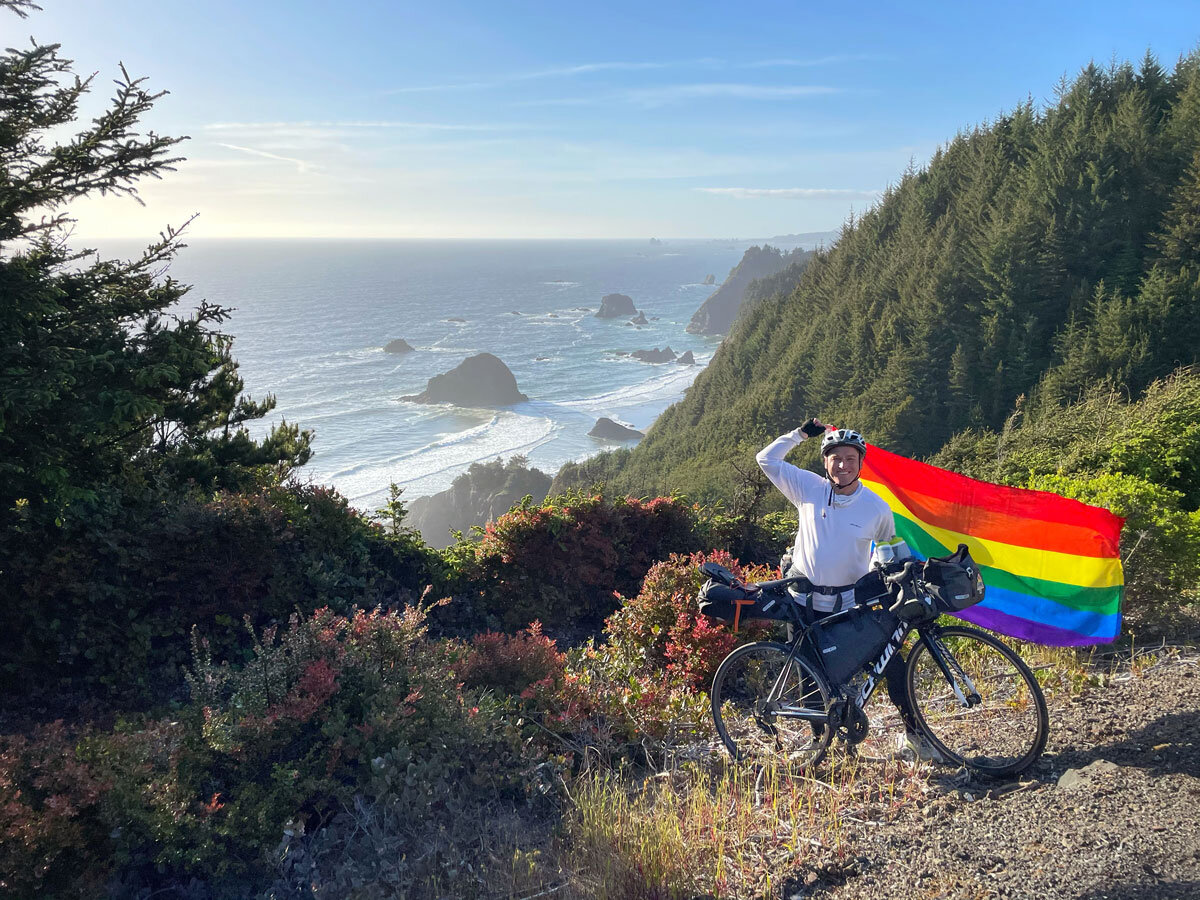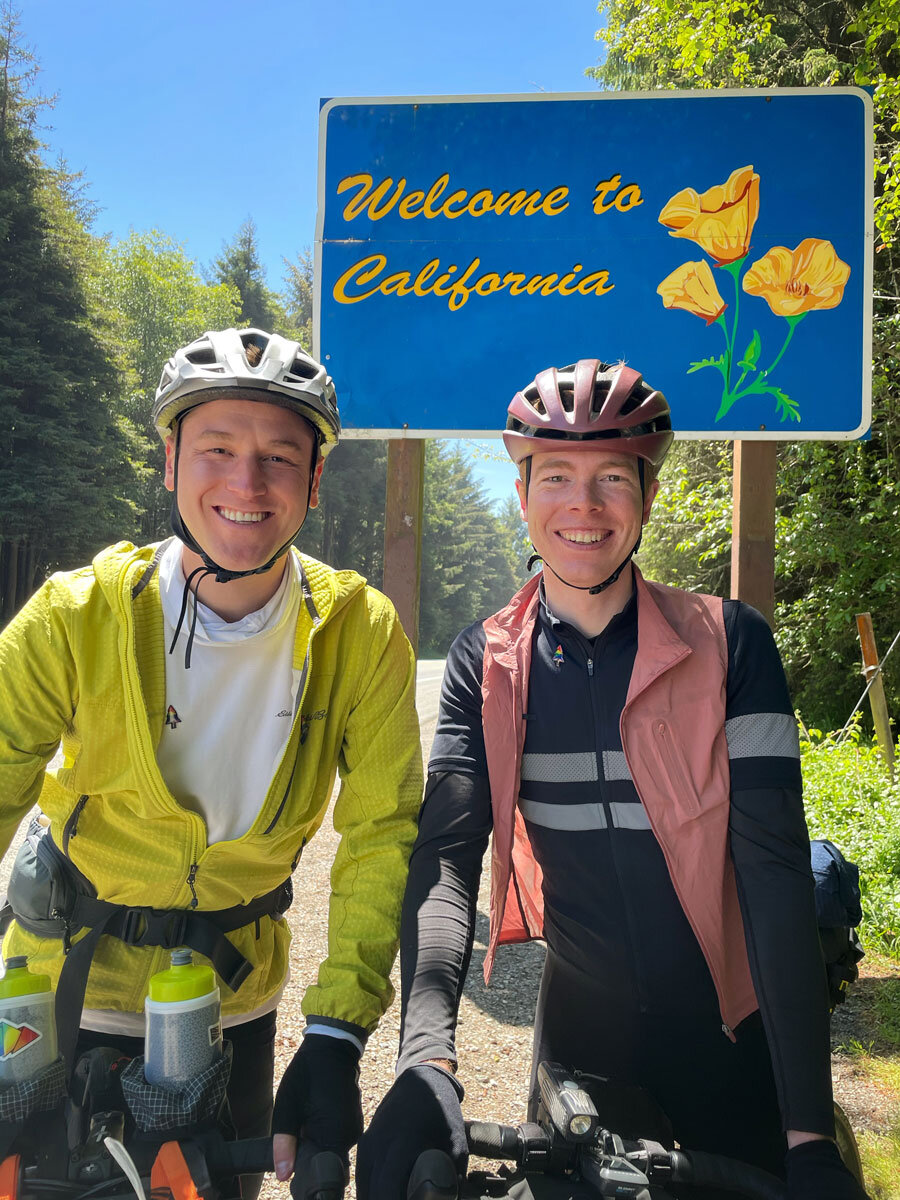"Is that a Schwinn?" Mikah Meyer bikes across Oregon to promote LGBTQ+ inclusivity in the outdoors
All photos courtesy of Mikah Meyer
It’s early June and Mikah Meyer is fresh off his first ever bike tour - a 14-day, 363-mile ride along the Oregon coast.
You might know Mikah as the first person ever to visit all 400+ NPS sites in a single trip, or from his advocacy work for the LGBTQ+ community. Mikah’s recent adventures include running across his home state of Minnesota to promote LGBTQ+ inclusivity in the outdoors through his Outside Safe Space program, and running across Mississippi, deemed by his followers as the country’s most homophobic state.
Mikah & his riding partner Cole at the California/Oregon border.
After trading in his running shoes for a Schwinn, Mikah may have caught the cycling fever. “It was a really positive and successful first bikepacking experience,” he says of the Oregon ride. But not everyone shared Mikah’s positive vibes.
Comments on the local news coverage in ultra-liberal Portland of his ride from showed a heap of negativity and ugly homophobia. Throughout his many years of doing this type of work, Mikah says the way he deals with the haters has evolved.
“At first it got to me, but now I look at it like a badge of honor,” he says. “After SNL made fun of Celine Dion, she said something like, ‘if they're saying and doing these things about me, then I must be doing something right.’ So I always think about that, and what I've learned is that most of the time when people write these things, it's their own ignorance or naivete coming through. It tends to reveal that their anger is something in their own life that they're uncomfortable with, and so I try to just have a lot of grace when that happens.”
These experiences prove exactly why Mikah’s work is important and necessary. “People have a knee jerk reaction often, and say, ‘you're making this issue up,’ or ‘nature doesn't care if you're gay,’ Mikah says. “And I'm like, ‘yeah, but you clearly do!’ They just proved my point on why we do need to change the culture and make outdoors culture as welcoming as a symphony hall, or a theater downtown, or an urban bubble.”
Mikah’s approach to changing culture isn’t the typical brand of hyper-polarization that we see so much of on social media today. “I'm not really here to preach to the choir,” Mikah says. “I feel like as our world and our culture has become more polarized, the more we get rewarded for that. What I try really hard to do with my work is to show people how similar we are and to do bridge building. As every good English teacher will tell you, it's way better to show people than to tell them.”
“What I try really hard to do with my work is to show people how similar we are.”
Speaking of showing vs. telling, Mikah didn’t do either on social media for the duration of his ride. “I think it's a better experience for my followers when they can get it live because it just feels more real and raw,” Mikah says, “but it was a way better experience for me not doing it live, mostly because bikepacking is hard. We would roll into camp and get the tents set up, and as soon as I put my head on that air pillow, I passed out.”
Bikepacking is indeed hard, especially when you’ve never done it before and when you train in Minnesota (not a lot of hills) for a ride in Oregon (lots of hills). Mikah says one of the coolest parts of his journey was realizing how far he progressed as a rider along the way in two short weeks.
“I stopped like four times on the first big climb we did on day one just to breathe, to change the clothes that I had, and to rest,” he says. “On our second to last day was the largest, steepest climb of the whole Oregon coast, and I was able to do the whole thing without stopping. After two weeks I was able to conquer this task that initially I couldn't. I was able to see a transformation in my own biking abilities. I was also super scared of going downhill fast, and I figured out that at one point on the trip, I got up to 35 miles per hour.” Mikah says learning how to pace himself, prepare for hills, and shift his weight properly helped him navigate the Oregon coast’s hilly terrain on his bike.
The bike in question was one of the major parts of Mikah’s trip. He partnered with Schwinn, which outfitted him with his trusty steed for the journey. “Schwinn is a brand that I feel like everybody's heard of, but most people we encountered didn't know that they made super sexy, all carbon road bikes, and so that got their attention,” Mikah says.
“They'd be looking and they'd be like, ‘is that a Schwinn?’ Everybody had a Schwinn story, so it was cool to know that this ride and this bike that I was using was part of a legacy that goes back over 100 years to 1895.”
Schwinn is one part of a seemingly changing outdoor industry that’s beginning to include more diverse representation - and not just during Pride Month. There’s certainly a great deal more that needs to be done, but it feels like the tide could finally be turning. Mikah says that he, too, has noticed a shift since he began doing his work five years ago.
“When I first really started working in this industry in 2016, the outdoor rec industry had never had a Pride Month ad,” he says. “So to see that change in five years is amazing. But it's also heartbreaking because I realized that the outdoor rec industry is still at least a decade behind the rest of corporate America. The only sort of pride anything that I found when I started getting involved in biking in 2020 was one promotion that Cannondale did with Gus Kenworthy for the AIDS/LifeCycle journey. That was it. So now to see that change and be part of that change is really hopeful.”
“We can all be role models and no matter where we are, it will make a huge impact.”
Change is ongoing and Mikah’s cycling journey displayed the need for ongoing work and advocacy. “After running across Mississippi, I was like, ‘Oh, I'm going to Oregon, it's super accepting and progressive,’ and certainly the news experience from Portland showed me something different,” he says.
“No matter where you are, there are people who don't feel like they can be themselves. A big takeaway from this was that we still have so much to do. We can't just say, ‘Oh, we've got openly gay people on TV now, we're fine.’ We can all be role models and no matter where we are, it will make a huge impact. There are people out there everywhere who are looking for light in the darkness, and we all have the ability to be that light.”
To be part of the Outside Safe Space program, visit the Outside Safe Space website to get your own pin or sticker.





